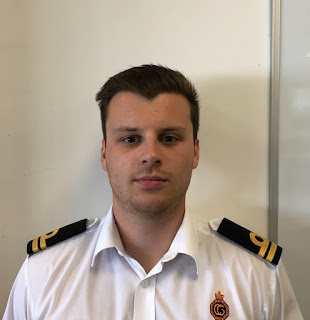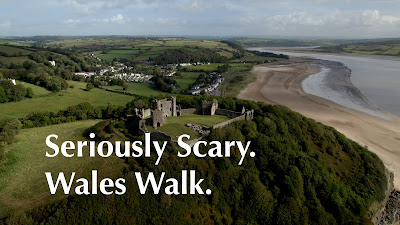International Control Room Week: What does it take to work in HM Coastguard's operations room?
Have you ever been in a HM Coastguard control room?
Have you ever seen what happens in the room where lives hang in the balance, where one decision can fundamentally change the outcome of a search and where some of the hardest decisions are made?
This International Control Room Week, we want to give everyone a chance to learn a little bit about what it takes to work in one of our operations rooms and provide some insight into the difficult but vital work they do.
And to express our gratitude for that.
Nicola Davies, Maritime Rescue Coordination Centre Commander at Milford Haven, said the work of control room staff is 'incredibly stressful but also incredibly rewarding' while Maritime Operations Officer Laura Kay highlighted the need to rely on the support and camaraderie of her fellow operations room colleagues.
"It's awe inspiring to see an operations team working together actually; it's a seamless process, they're so in tune with each other," Nicola said. "It's quite a special thing to see, that team effort, but it's really important as well. They need to support each other with operational matters but also with handling the emotional too, some of the calls can be very difficult."
Laura agreed: "Working and communicating well with your team helps to alleviate a lot of the stressful aspects of the role, as you will very rarely be working alone.
"The toughest incidents to deal with are those which do not have the desired outcome. But as long as you are confident that you’ve done everything you possibly can in the circumstances, it makes it a bit easier."
Matt Rogers, Team Leader at Falmouth MRCC, added: "Working in the control room is a rewarding job, being able to help those in need. It’s challenging, every day is different and you’ve always got the unknown; you never know what the next call will be. It could range from a report of unexploded ordnance to a person stuck on a cliff.
"When you’re able to coordinate the response to a successful rescue there’s a strong sense of achievement."
Errol Smith, MRCC Shetland Commander, said: "It is good to go home at night knowing you have taken part in an incident as part of a team that has safely returned a loved one to their family or, in a worst case scenario, given some sense of closure to loved ones with an answer for what happened."
Jordan Grebby, Team Leader at MRCC Humber, agreed: "My job is amazing, I come to work and help people who are in some of the most difficult situations they are going to be in, in their lives.
"It is one of the most rewarding things, knowing you have helped someone who is in a vulnerable situation. The job is varied, exciting and extremely rewarding."
Control rooms are made up of Maritime Operations Officers, Senior Maritime Operations Officers, a Team Leader and the SAR Mission Coordinator, in charge of a search and rescue incident.
Who is in the operations room?
Maritime Operations Officer (MOO): Handles emergency and routine calls, gather and analyse information in order to respond to incidents and emergencies, and provide the mariner, coastal user and partner organisations with maritime safety information.
Senior Maritime Operations Officer (SMOO): Supervises work of MOOs, provides support when dealing with an emergency call.
Team Leader: Manages a team within the control room and is the senior member of staff on their team. They are responsible for the training, administration and overall leadership of the team.
SAR Mission Coordinator (SMC): The SMC is responsible for coordinating a search and rescue incident. The SMC on shift changes, and could be either a Team Leader or a SMOO.
Nicola explained that she steps into the role of an SMC during her 'on-call weeks' and understands well how it all operates.
"It isn't just search and rescue incidents," she said. "It's a really varied job, with so many different things that come up. We provide weather reports on VHF Radio (for vessels) every four hours, constantly assess conditions and deal with whatever comes in. You never really know what it could be or who could be on the end of the phone.
"We are constantly dealing with the public who ring us about plenty of different things, we're happy to provide advice and information when we can – we give a lot of weather forecasts, and we're just happy to be playing a part in the local community."
The incidents themselves can be as varied, she added, as well as any where, with HM Coastguard working on a national network ensuring any control room would step in to fill busy periods in other areas.
"You pick up the phone and there might be a person telling you there's a bomb on the beach," Nicola said. "Or there's a terrified parent on the other end saying their child is missing, or someone has gone overboard or even a report of pollution. And it might come from anywhere in the UK, if another control room is dealing with a big incident, other calls will come to us.
"Whatever the report, it's amazing how the control room atmosphere instantly becomes a professional and serious place the minute the phone rings."
Laura added: "In the control room, we are responsible for coordinating search and rescue incidents, this includes mission planning, sending of search and rescue teams (coastal rescue teams, RNLI lifeboats, coastguard helicopters), planning and passing search instructions, and liaising with other emergency services (police, ambulance service, fire rescue service).
"In Shetland we also cover a portion of the North Sea’s Oil & Gas offshore installations, which generally includes dealing with medical evacuations, offshore emergencies and counter pollution incidents.
"A large part of our role in Shetland is vessel traffic monitoring (VTM), which involves monitoring vessels in our zones, taking voluntary marine reports in the Pentland Firth and Fair Isle Channel, and questioning vessels if they appear to be in any difficulty, at risk of collision, or in areas to be avoided.
"We also take routine press calls, broadcast the weather and maritime safety information every three hours, accept and process time expired pyrotechnics (flares), complete chart updates and corrections, and broadcast NAVTEX messages (Navigational Telex) which are weather forecasts, navigation and meteorological warnings, and urgent information for search and rescue, transmitted directly to ships in print format.
"And of course we also communicate and assist with members of the public with any queries they may have."







